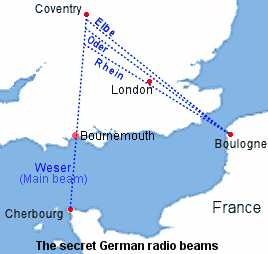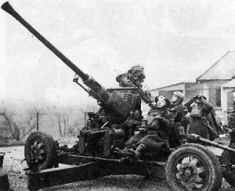|
Secret war in the Winton sky
As Winton queued for rations and stumbled its way
through the wartime blackout a secret war was being fought in
the skies above.
 The
main activity hinged on German use of a top secret radio beam
system that was used to guide hundreds of bombers to their targets
in England. The
main activity hinged on German use of a top secret radio beam
system that was used to guide hundreds of bombers to their targets
in England.
Luftwaffe pathfinder aircraft flew along the beam
until it was crossed by other beams informing the pilot that he
was approaching and then above his target.
The significance for Bournemouth was that in attacks
on the English Midlands the main beam was transmitted from Cherbourg
and in some instances crossed directly above Winton and Moordown.
The German bomber assault on the Midlands was launched
in 1940 and called "Moonlight Sonata". Its most notorious
victory was the blitzing and near destruction of the city of Coventry.
Tracking the beams
The main beam being transmitted from Cherbourg had
two elements - the narrow 30 metre wide path that led to the target
and a wider lower power "entry" beam" that stretched
from the French Coast and ended approximately over the Bournemouth
and Poole conurbation. The "entry beam" was meant to
be easy for the bombers to find before they started to "ride"
the much narrower main beam.
 British
experts rapidly realised that if they could pinpoint the exact
position of the beam they would be able to work out the planned
target and take necessary action. In practice this meant that
Avro Anson aircraft became a familiar sight flying back and forth
over North Bournemouth using special equipment to detect and intercept
the beam. British
experts rapidly realised that if they could pinpoint the exact
position of the beam they would be able to work out the planned
target and take necessary action. In practice this meant that
Avro Anson aircraft became a familiar sight flying back and forth
over North Bournemouth using special equipment to detect and intercept
the beam.
Fortunately the German operators tended to turn
the system on well before the raids were launched. This gave the
RAF time to detect and trigger countermeasures.
Local people remember swarms of German bombers crossing
the town on the nights of big raids on the Midlands. Many people
specifically remember the November night when Coventry was attacked.
Guns on the streets
 Part
of the response was to move anti-aircraft guns under the expected
path of the enemy aircraft. These mobile guns were kept hidden
during the day and moved into position at night. Part
of the response was to move anti-aircraft guns under the expected
path of the enemy aircraft. These mobile guns were kept hidden
during the day and moved into position at night.
On several occasions they were dotted all along
Wimborne Road and shrapnel rained down on the roofs of houses.
A very powerful searchlight was installed at Throop.
Its object was to illuminate the bombers as they passed over.
Unfortunately the Germans sent in a lone fighter
which dived down the search light beam and opened fire on it.
The light unit was destroyed and its crew were killed.
Secret weapon
Radio transmitters were used to transmit jamming
signals that confused the equipment on the German aircraft. And
the boffins also tried out a new and unconventional form of anti-aircraft
defence.
Residents around The Avenue and Muscliffe Lane woke
up one morning to find several hundred yards of piano wire across
the roofs of their houses. It was attached to grey spindles about
the size of a paint can.
Nothing was ever said publicity about this secret
experiment but it is believed the spindles were fired into the
air, probably by a rocket or a device called a Holman Projector.
The wire was intended to entangle the propellors of the enemy
aircraft and bring them down.
It is not thought to have been a great success and
was apparently never heard of again.
|